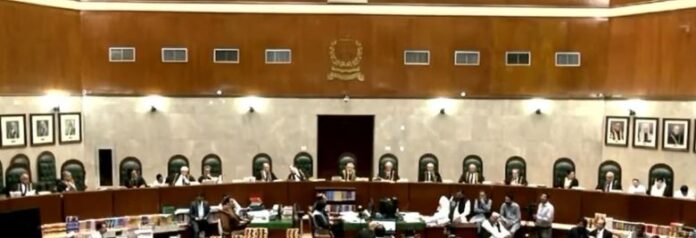ISLAMABAD: The Supreme Court (SC) in its detailed judgment on the Supreme Court (Practice & Procedure Act), 2023 maintained on Wednesday that the legislation has strengthened the judiciary and created greater independence.
“The Act does not in any manner violate the Constitution, it does not undermine the Supreme Court, nor does it compromise the independence of the judiciary. In effect it does the very opposite in ensuring the enforcement of Fundamental Rights, strengthening the Judiciary and creating greater independence therein,” says the majority judgment, authored by Chief Justice of Pakistan Qazi Faez Isa and endorsed by nine other judges.
On October 11, the SC by a majority 10 is to 5 declared the Supreme Court (Practice & Procedure Act 2023) as valid.
The detailed judgment maintained that, “The Constitution empowers Parliament to legislate with regard to making the practice and procedure of the Supreme Court as it specifically stipulated in Article 191. Parliament enacted the Act which does not in any manner infringe any of the Fundamental Rights, rather facilitates their enforcement. The Act also grants an appeal to one who is aggrieved by a decision of the Supreme Court which is passed in exercise of the original jurisdiction of the Supreme Court under Article 184(3) of the Constitution.
“A standard good worldwide practice and the Injunctions of Islam, require that an appeal be provided and when two interpretations are possible, the one that conforms with the Injunctions of Islam shall be adopted.
“Article 175(2) of the Constitution envisages the conferment of jurisdiction. A larger Bench of the Supreme Court has been conferred with this additional jurisdiction of appeal which fully accords with the Constitution.”
The judgment noted that, “We have very carefully considered each and every provision of the Act, and are of the view that it has facilitated access to justice, instilled transparency, made the realization of Fundamental Rights more effective and the Supreme Court more independent. The office of the Chief Justice has also been strengthened as there is an element of continuity when consultation takes place with the two most senior Judges. The measures taken in the Act ensure judicial independence, and the Supreme Court has been made to better serve the people; we endorse the following definition of judicial independence.”
Read Parliament intended well in SC (Practice & Procedure) Act: CJ Isa
It further maintained that the “Supreme Court comprises of the Chief Justice and all the Judges of the Supreme Court. The Constitution does not grant to the chief Justice power to decide cases unilaterally and arbitrarily. The Chief Justice cannot substitute his wisdom with that of the Constitution. Nor can the Chief Justice’s opinion prevail over that of the Judges of the Supreme Court. And, the term ‘Master of the Roster’ is not mentioned in the Constitution, in any law or even in the Rules, let alone stating therein that the Chief Justice, is the Master of the Roster and empowered to act completely in his discretion”.
“The word master is offensive in a constitutional dispensation founded on democracy. Master also connotes servitude, the extreme form of which is slavery which is prohibited by the Constitution. Islam establishes the principle of equality, and the Constitution does not permit transgressing the Injunctions of Islam, the State religion of Pakistan. The opening words of the Constitution are the most beautiful names of the Creator, Ar-Rahman (the most Beneficent) and Ar-Rahim (the most Merciful). It proceeds by recognising that, “sovereignty over the entire Universe belongs to Almighty Allah alone” and that the exercise of authority is a sacred trust,” the SC further notes in its detailed judgment.
“The only servitude the Constitution (and Islam) envisages is to the Creator,” it adds.
The judgment maintained that, “Servitude also negates consultation. The Holy Qur’an mandates, “Do that which is in agreement amongst the people”. Qur’anic exegetes are unanimous in the interpretation of this verse, and say that consultation is obligatory in respect of all matters pertaining to more than one person. Because: (a) no one should impose their will on others, (b) imposing one’s will on others either means that one does not give importance to others or that one deems oneself to be more intelligent, both of which are morally reprehensible and (c) deciding an issue that pertains to the people is a serious thing and one should fear Allah. And the following principles may be derived from the said verse: (1) all requisite information be provided, (2) appointments should not be made on the basis of fear or favour, (3) leaders should seek advice from advisors, (4) advisors must give their honest and well-considered opinion and (5) matters should preferably be resolved consensually, failing which through majority opinion.”
The SC upheld that, “History stands witness to the fact that when power is concentrated in an individual, disastrous consequences invariably follow. Irreparable damage is caused to the Judiciary and to the people of Pakistan when the legitimacy, integrity and credibility of the Judiciary is undermined. If the people lose their trust in the Judiciary, it will render decisions made by it mere words on paper, without credibility and moral authority. The surest way for this to happen is when cases are not decided in accordance with the Constitution,”

















